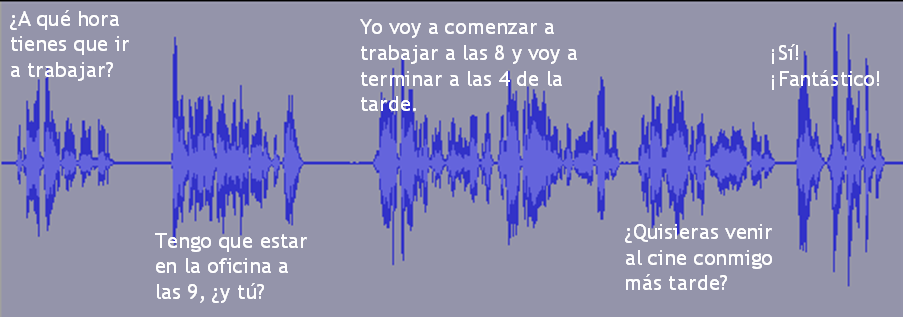Contrasting First & Second Language Acquisition [2/2]
But isn't slow speech better for beginning students?
NO! It's possibly the worst strategy to get to understand real native speakers and the reason why so many people can't understand even basic conversations at a normal pace of speech!
Slowing down the way people talk prepares learners for a reality that does not exist beyond the classroom. Even worse, it gives them the feeling that, just like in writing, there are spaces in between the words. They expect people to make exactly those pauses whenever talking to them.

[Sample dialog taken from THE SPANISH AUDIO BLASTER. This is the way it would be represented if we paused in between words like it's done in most programs]
Most Spanish programs want to make you believe that native speakers pause in between words. That is why you probably struggle to understand what they say in real conversations. Because they don't pause at all!
This is how people speak in real life:

[Sample graphic taken from THE SPANISH AUDIO BLASTER RELOADED.]
Unlike written materials, people do NOT pause in between words in real communication. Actually the last sound of one word will always blend to the initial sound of the next word. Listening to slowed-down Spanish can only hurt your best listening comprehension efforts as it totally ignores this crucial element of oral communication.
Here are two samples from the first dialog in the program, one from Latin America and the other from Spain)
Spanih Audio Blaster, Group 1, Dialog 1 (Latin America)
Spanish Audio Blaster, Group 1, Dialog 1 (Spain)

[The key is NOT to slow down the materials students listen to because that does not prepare them for the real world. The key is actually to train them to understand the way people talk in the real world.]
So even beginners have to be trained to understand fast-paced conversations?
Yes. The dialogs that appear above are actually for beginning students. I can assure you that if you show these dialogs to even advanced learners not used to real speech, they would cry in the middle of their examination, unable to get anything they are saying. However, with the right approach, understanding real spoken Spanish is within grasp for anyone. This idea of fast-paced conversations from the get-go may defy logic for some. After all, how could you speak so fast to someone who is just starting?
Well, just look at how natural language acquisition takes place:
VIDEO #3: Dad-Baby (3)
[Focus on the first 40-50 seconds]
Even if parents make silly voices when talking to their babies, their pace of speech is absolutely natural and normal, not much different from the way they would talk to a customer or a neighbor So from the get-go, babies are presented with real samples of conversation in context. They are picking up the language they need at that moment at a normal pace of speech. And they will definitely understand much more than they can actually produce.
For example, at the age of two, a child could easily understand everything her parents are telling her. But if she needs to talk or even say the same, her vocabulary will be more limited_ or even completely unintelligible. This is perfectly normal. In normal language acquisition, comprehension always precedes production. You will always be able to understand more than you can actually say, not only when you are a baby but also at any stage of your life.
For instance, a doctor could be talking to a patient using a lot of jargon, and unless that patient is a doctor or someone who knows a great deal about medicine, they may probably understand everything the professional is telling them , but if they have to explain it to someone else, they would probably feel at a loss for words. They may be able to explain what the doctor said by using their own words. Even if they could initially understand 100% of what they were told, some words and terms just won't come to them.

[You could probably understand what the doctor is telling you, but could you explain it to someone else by using his exact words, explanations, and terminology?]
But give it time. If they keep on reading or listening to people talk about the same topic for some time, then that jargon will become an active part of their language and soon they will be able to talk accurately about that specific topic. That is normal language acquisition in which comprehension will always precede production.
Unfortunately, when things are not done right in the classroom or learning environment, we find exactly the opposite case. An overwhelming number of learners have things upside down. They can express even extremely complex ideas with ease, yet they cannot understand even the most basic of phrases. Even worse, they try to overcome this by working hard on programs that ignore even basic rules of language acquisition. And that's when they end up listening to news and stories said at such an extremely low pace of speech that would make most native Spanish speakers fall asleep. Or they are given questions to read before listening to any audio as if people in real life first gave you a set of questions and then started to talk to you. It is a very hard scenario for any learner to be in.

[Slow is not always better! It can actually get you in trouble more often than not!]
The good news is that with an appropriate program in place and with the right guidance, listening comprehension is a very simple skill to improve, regardless of your current level in the language. Even better, you should be able to see dramatic results in as little as 2 weeks. Of course, you will need to do your part. I wish I could tell you it's something you can do while you sleep without any serious work on your part. That's never going to happen. But if you are willing to do your part and follow a systematic program day in-day out, improving your listening skills is as simple and predictable as stating that two plus two equals four.
If these three elements are in place: 1) the right program 2)the right materials and 3) a learner willing to do their part, getting results is almost mathematically predictable. In my more than 20 years teaching English and Spanish as foreign languages, I yet have to find a learner that with the right tools and training and work on their part is unable to improve their listening skills fast.
But mind you, it's not about selecting one or two of these elements. You need all of them. Get the right materials, the right instructor, do your part and the sky will be the limit!
What is your experience in listening comprehension?
If you have any comments, questions or suggestions, please post them below. Looking forward to hearing about your experiences regarding your listening comprehension challenges.
Go back to part 1 – Articles Index